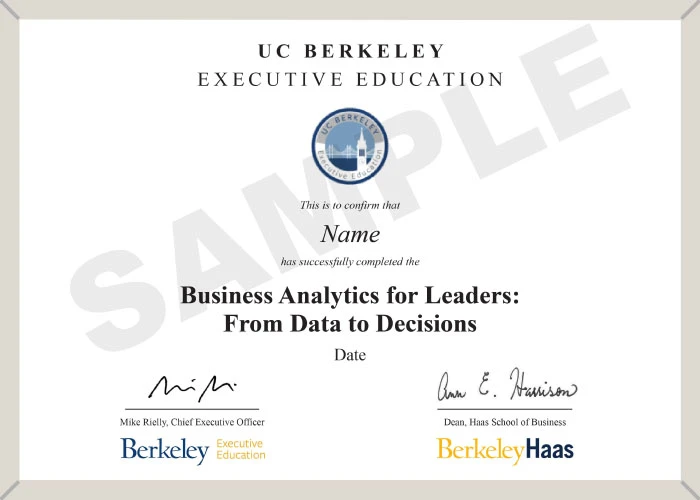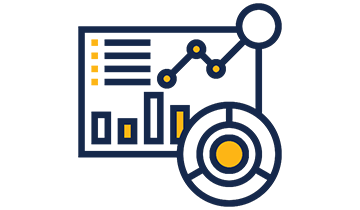Business Analytics for Leaders : From Data to Decisions
Enrolling in this program is the first step in your journey to alumni benefits.
Learn More
Key Takeaways
This program will position you to:
Gain competitive advantages by capturing data-enabled business opportunities
Create data-based decision-making models across your organization
Leverage data and experimentation to drive innovation
Better evaluate business analytics approaches and strategies
Develop a virtuous cycle built on user engagement, data collection, algorithm design, prediction, and improvement
Drive business decisions through practical application of an AI-centric operating model
Who is This Program For?
Businesses are using analytics to increase efficiency, improve customer service, and identify risks and opportunities across all sectors. This program is designed for business professionals who recognize this growing trend and want to use data and analytics techniques to guide strategy at the top levels of their organizations. (No previous coding or advanced analytics experience is necessary.) Business Analytics for Leaders: From Data to Decisions program could be particularly beneficial for those in the following roles:
Program Topics
Over the course of two months, you will incrementally build your analytics acumen to better equip you for a rapidly evolving, data-centric world.
Program Faculty

Professor, UC Berkeley’s Department of Economics and Haas School of Business
An expert in applied microeconomics, Prof. Finan teaches graduate courses in data analytics in Haas’ Executive MBA Programs. His research uses data analytics to explore the in...

Associate Professor, Department of Economics, UC Berkeley
An expert in applied microeconomics, Prof. Finan teaches graduate courses in data analytics in Haas’ Executive MBA Programs. His research uses data analytics to explore the in...
Testimonials

Certificate
Get recognized! Upon successful completion of the program, UC Berkeley Executive Education grants a verified digital certificate of completion to participants. Participants must complete 80% of the required activities including a capstone project (if any) to obtain the certificate of completion. This program also counts toward a Certificate of Business Excellence.
Successful completion of this program fulfills two curriculum days (minimum requirement of 17 curriculum days) towards the UC Berkeley Certificate of Business Excellence (COBE).
Learn more on how it works here.
Note: This program results in a digital certificate of completion and is not eligible for degree credit/CEUs. After successful completion of the program, your verified digital certificate will be emailed to you in the name you used when registering for the program. All certificate images are for illustrative purposes only and may be subject to change at the discretion of UC Berkeley Executive Education.

This program counts toward a Certificate of Business Excellence
Curriculum Days: Two days
Pillar(s): Entrepreneurship & Innovation / Strategy & Management
A UC Berkeley Certificate of Business Excellence gives individuals the opportunity to create a personal plan of study structured by our four academic pillars. Participants will earn a mark of distinction with certification from a world-class university, and enjoy the flexibility of completing the program in up to three years.
FAQs
Didn't find what you were looking for? Write to us at learner.success@emeritus.org or Schedule a call with one of our Program Advisors or call us at +1 864 668 8832 (US) / +44 121 387 3504 (UK) / +65 3129 7057 (SG)
Early registrations are encouraged. Seats fill up quickly!
Flexible payment options are available.
Starts On




